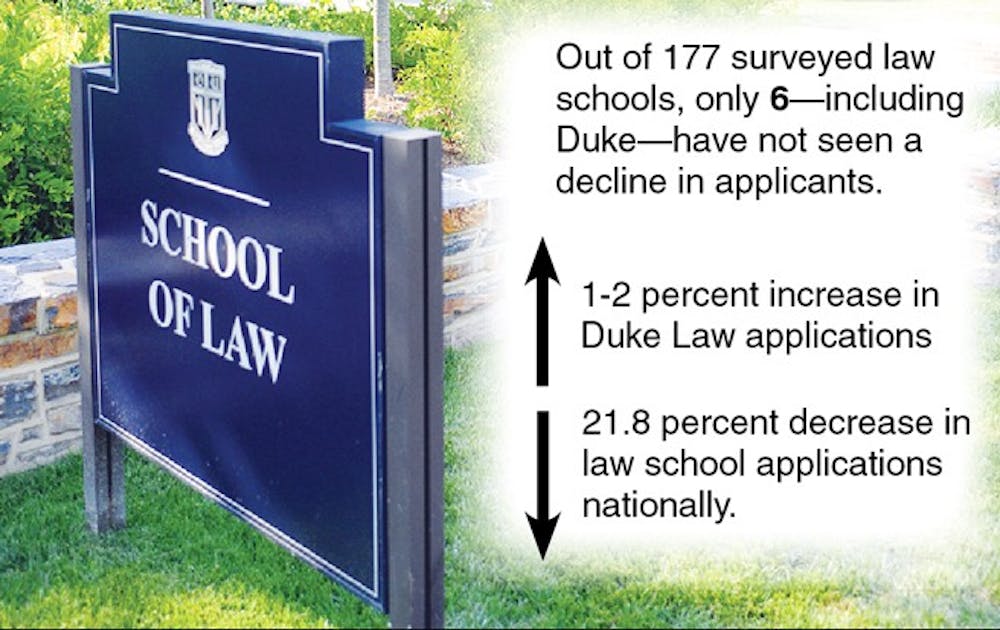Amid a 21.8 percent decline nationally in law school applications this year, the School of Law has managed to keep its number of applicants steady, as the final tally is expected to be up 1 to 2 percent from last year.
The number of applicants decreased at 177 law schools by at least 10 percent—Duke Law is one of the only six schools that has avoided this national trend, according to a Feb. 8 Law School Admission Council report provided to admissions officials. This decline likely stems from increased student debt and a much more competitive legal job market. Extensive media coverage in the last year about a decline in legal employers and rising student debt has made prospective law school students cautious and can probably account for the application decline, said Bill Hoye, associate dean of admissions and student affairs.
“Potential applicants are waiting for a signal of an improvement in the legal market,” Hoye said. “Those who did apply this year are looking for a school that is small, nimble and aggressive enough to respond to their individual needs, so they can start their legal career in a positive way.”
The Law School provides the attention and resources to ensure this positive start for which prospective law students are looking. It has established programs that are intended to help students acquire the lawyering skills that are necessary to show an employer that they can add value, Hoye said.
These programs include working on a full-time basis through externships, representing real clients under the supervision of a professor in clinics and participating in Winter Session, a program in which law students voluntarily return during the first week in January to take courses that are very narrowly focused on skills make that employers want to see on students’ transcripts.
“Overall, our applicants are seeing this place as small enrollment with all these different resources focused on developing one’s career,” Hoye noted. “Many of our applicants are drawn to Duke because they appreciate the focus we’ve maintained on helping to identify the premium jobs in the legal market.”
Hoye noted that Duke Law’s programs, in addition to its recent launch of a dual-degree program that focuses on entrepreneurship, are committed to helping its students secure premium jobs in the legal market, such as highly sought after clerkships and jobs in government.
Senior Hannah Schechter, who applied to Duke Law among eight other top law schools, said the school appears to have a more intimate law school experience that truly integrates its dual-degree and international programs, setting it apart from its competitors.
Schechter also noted that Duke was more generous with merit scholarships than the other schools to which she applied, highlighting the role tuition and debt has played in the national decline.
“[The law school applicant decline is] something that’s been due to happen for a while,” said Schechter. “There were so many people applying for the wrong reasons, and if you’re going to spend $100,000 on a degree, you should really think twice.”
Many potential applicants did think twice. In the past, many students decided to apply to law school by default if they had not determined their plans after graduating college. The increasing financial burden and fewer legal job opportunities have led to not only a smaller, but also a more focused pool of applicants, Hoye noted.
“I have noticed a difference [in the applicants to Duke Law this year in comparison to previous years],” Hoye said. “The applications I’m seeing this year are from students who have been very diligent in thinking about what they want to do in the future. They are very well informed about the legal profession, and they know they want to be lawyers.”
Senior Will Hawkins, an applicant to 12 law schools, including Duke Law, said that although he knows assuming the financial burden of law school is a big risk, he has always wanted to be an attorney, and he is willing to take on the risk "in pursuit of [his] dream.”
With the current tumultuous situation, the future of legal education is unclear, Hoye noted. Some schools that are experiencing lower applicant numbers may take on smaller first-year classes, or may accept students with slightly less strong academic credentials.
“At Duke, we’re being just as aggressive as always to make sure our students are well-positioned,” Hoye said. “We’re preparing our students to be successful in a changing environment.”
Get The Chronicle straight to your inbox
Signup for our weekly newsletter. Cancel at any time.

